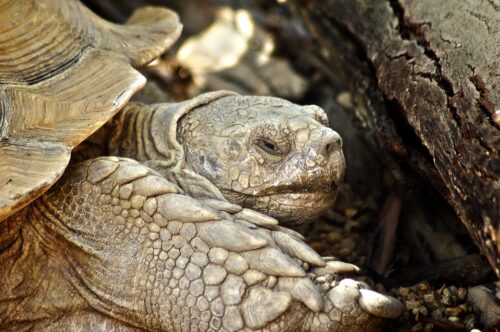It’s quite common for pet tortoises to have eye problems, although as responsible owners we should try to prevent this as far as we possibly can. Tortoises are known to suffer from eye swelling if there is a problem with their environment. They are also prone to ear abscesses, which can also lead to their eyes swelling.
In most cases, eye problems in tortoises are curable – and often, all it takes is some environmental improvement or a deep clean of their enclosure. With that in mind, if you don’t want a small problem to evolve into a more serious issue, then you should endeavor to make sure the matter does not remain untreated.
Reasons for a Tortoise Eye Injury or Infection
There are several reasons why a tortoise might suffer an eye injury, infection – or be unable to open their eyes.
Sometimes, the fact they do not open their eyes all day long is not because of an injury or infection, and indeed it may be a completely harmless behaviour that goes away on its own. In other cases however, it may signal a problem in their enclosure. Either way, you should air on the side of caution if in any doubt.
The main reasons for these issues include:
- Lack of Humidity
What do you do when you feel the air drying out around you and your eyes? Your natural reaction is of course to keep your eyes closed. The drier air is, the more it will affect your vision, drying your eyes to the point where you feel like you constantly have sand stuck in there.
The same thing applies to tortoises. If they feel like their eyes as well as the air around them is dry, they will do whatever they can to retain what moisture they do have on their eyes. Again, often it’s not the sign of an actual eye problem – but if you do nothing about it, it might eventually become an issue.
- Lack of Suitable Airflow
If the problem is not the humidity, then it might be the exact opposite: a lack of a through draft of fresh air, with the humid air instead allowed to become stagnant.
Too much humidity might lead to bacteria or allergens forming in the enclosure, leading to a variety of eye problems. To that end you should always make sure your tortoise’s enclosure features adequate ventilation.
With open topped tortoise tables this is usually a given, which is why they are the recommended choice of enclosure for nearly all breeds of tortoise.
- Vitamin A Deficiency
Giving your tortoise the wrong food may lead to a vitamin A deficiency – which can ultimately cause your tort to have eye issues. Typical tortoise diets that lead to this scenario include a lot of iceberg lettuce, meat-based diets, or commercial feed products that are of a low quality.
Foods such as iceberg lettuce are really only of use as a source of hydration, while meat products feature far too much protein.
In order to obtain the right nutritional balance, including sufficient levels of vitamin A, so should provide a varied diet of vegetables, and edible weeds and flowers.
- Contaminated Water
If the water in your tort’s enclosure is contaminated or dirty, it may cause their eyes to become infected. Together with other environmental factors such as poor ventilation, this can worsen their symptoms, irritating their eyes, or worsening infections.
- Rocks, Decorations, Heat Lamps, and Sand
The elements you use for tortoise enrichment can also lead to eye injuries. This is why you need to be very careful what you add to their little indoor home.
An oppressive heat lamp that is kept too low to the tortoise, or radiates heat across too much of the enclosure, may cause their eyes to dry out.
Too many obstacles present in the enclosure may lead to the tortoise accidentally scratching their eyes against the objects around them.
Whilst it may for a component part of your soil based substrate, sand may also get in the eyes or your tortoise, causing irritation. This is one reason your substrate should be kept damp, so that loose particles do not dry out and get kicked up into the air.
Symptoms of Tortoise Eye Problems
- Discharge
Fluid discharge or tears are a sign of tortoise eye problems, often caused by dehydration. Sometimes, it may even be the sign of a deeper problem, such as a virus or bacteria from contaminated water.
If the discharge looks like pus, then it might mean that your tortoise has an eye infection. In this case, a visit to the vet is almost certainly on the cards.
- Swelling
Swollen or puffy eyes in a tortoise can be caused by a variety of factors. This particular symptom may be a result of an infection, vitamin A deficiency, over exposure to UVB, or an injury caused by elements within its enclosure. If the eyelids are also swollen, then it might be a sign of a bacterial infection – in which case, you might once again want to take your little friend to the vet to get them checked over.
- Continuous Rubbing
Just like you or I always rub our eyes when we feel discomfort or have a problem such as an allergic reaction, so too will your tortoise when they have an eye problem, which can of course cause even more irritation, quickly becoming a vicious cycle.
If the symptom is associated with the fact that they cannot keep their eyes open, then this again might be because the air is either too humid or too dry.
- Sunken Eyes
If your tortoise’s eyes appear swollen, then this might signal the fact that they are dehydrated. Always make sure they have access to plenty of fresh water, and that the enclosure is set at a comfortable temperature.
There is such a thing as “too hot,” even when it comes to cold-blooded tortoises.
- Red and Inflamed Eyes
If the eyes of your tortoise appear red or inflamed, then the cause may be over exposure to UVB light. Whilst over exposure to UV light might seem unlikely, it can happen, which is why it is important not too have your UV bulb switched on for more than about 10 hours per day. Remember strong sunlight does not shine for more than this, and the aim is to simulate nature.
Red and inflamed eyes It might also be a symtom of a respiratory infection.
- Inability to Open Eyes
Sometimes, tortoises may not want to open their eyes, even if technically speaking they are not injured or swollen. Low humidity levels along with overexposure to UVB light may cause them to keep their eyes closed as often as possible, in a desperate attempt to keep hold of the humidity.
That being said, if the eyes are physically swollen shut, this might be a symptom of an ear abscess. If this is the case, you should most definitely see the vet.
Treatment for Tortoise Eye Problems
Many times, tortoise eye problems are caused by mechanical damage – in other words, damage caused by external factors such as a grass seed or a scratch. Often, these problems will go away by themselves, provided you keep your tortoise clean. Regularly soak/clean them and make sure that their enclosure also stays impeccably clean.
If the problem is caused by an infection, an antibiotic cream or an injection will often do the trick.
Tortoises may also develop cataracts, but there isn’t a treatment for this. Although if over exposure to UVB is deemed to be the reason, then reducing exposure may halt the progress of the condition to some degree.
If the eye problem causes the tortoise to go blind, then it can still continue to live with a reasonable quality of life as long as the enclosure is free of hazards that the tortoise may injure themselves on.
If the eye issues are caused by a vitamin A deficiency, then the vet may suggest a change in diet.
In the case of eye problems believed to be the result of dehydration, you may have to give the tortoise more baths throughout the week. Also, you may need to reduce the humidity and heat of the enclosure, and make sure that fresh clean water is always accessible, if it is not already.
It is best practice to see your veterinarian from the moment you notice any kind of eye problem. If the tortoise is completely unable to open its eyes or if its eyes are swollen and have too much discharge, this is a clear sign you should seek help.
Complications that Might Arise
Eye problems are quite problematic if they are not treated on time. More often than not, if only one eye seems slightly swollen, then it is unlikely to be an infection. Your tortoise probably just scratched its eye. However, if the problem is present in both eyes, then it might indicate a developing infection.
If the problem is not treated before it goes past the irritation stage, your tortoise may have a pus-like discharge rather than a clear, often harmless kind. If this happens, and it’s left untreated, then the infection can go all the way to the ear and throughout the rest of its body. Severe infections can lead to either blindness or death.
A scratch or injury that is too deep might also lead to your tortoise losing its sight. To avoid this kind of complication, you should go to the vet immediately. With that in mind, while a vet may prevent a small injury from getting worse, they may not be able to prevent blindness caused by a bigger injury, but they are of course the best chance you have if such a situation arises.
Prevention of Tortoise Eye Problems
To prevent issues related to humidity, you want to ensure the humidity levels in the enclosure stay at around 50-60%. Still, each tortoise has different needs, which is why the enclosure should have a humid area and a dry area as well. One corner should be at 50% humidity or so, whereas the other should be at 60%. This way, the tortoise can choose their preferred spot depending on how they feel throughout the day.
Alongside sharp scenery items, make sure that you don’t use sharp or inappropriate bedding either (hemp is probably the biggest no no here), as it can cause your pet to cut or injure itself.
To reiterate the importance of a helathy diet, offer the tortoise a healthy, balanced diet so that it does not end up with a vitamin A deficiency. Likewise ensure the tortoise always has access to fresh water.


